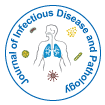Ecological Changes and the Resurgence of Mosquito-Borne Diseases
Received Date: Jan 01, 2025 / Published Date: Jan 31, 2025
Abstract
Mosquito-borne diseases, including malaria, dengue, chikungunya, and Zika virus, have resurged in many regions due to ecological changes driven by climate change, urbanization, deforestation, and altered land use patterns. Rising temperatures, increased humidity, and shifting precipitation patterns have expanded mosquito habitats, allowing vectors such as Aedes, Anopheles, and Culex species to thrive in new geographic regions. Rapid urbanization, poor waste management, and stagnant water accumulation further create breeding sites, exacerbating disease transmission. Additionally, deforestation disrupts ecological balances, bringing human populations into closer contact with infected vectors. The interplay between these environmental factors and global travel accelerates disease outbreaks, posing significant public health challenges. Effective mitigation strategies include strengthening vector surveillance, implementing sustainable urban planning, and developing innovative vector control measures such as genetically modified mosquitoes and biological larvicides. Addressing the resurgence of mosquito-borne diseases requires a multidisciplinary approach that integrates environmental management, public health interventions, and global cooperation to curb transmission and protect vulnerable populations.
Citation: Gyrate F (2025) Ecological Changes and the Resurgence of Mosquito- Borne Diseases. J Infect Pathol, 8: 285. Doi: 10.4172/jidp.1000285
Copyright: © 2025 Gyrate F. This is an open-access article distributed under the terms of the Creative Commons Attribution License, which permits unrestricted use, distribution, and reproduction in any medium, provided the original author and source are credited.
Select your language of interest to view the total content in your interested language
Share This Article
Recommended Journals
Open Access Journals
Article Tools
Article Usage
- Total views: 657
- [From(publication date): 0-0 - Dec 21, 2025]
- Breakdown by view type
- HTML page views: 517
- PDF downloads: 140
